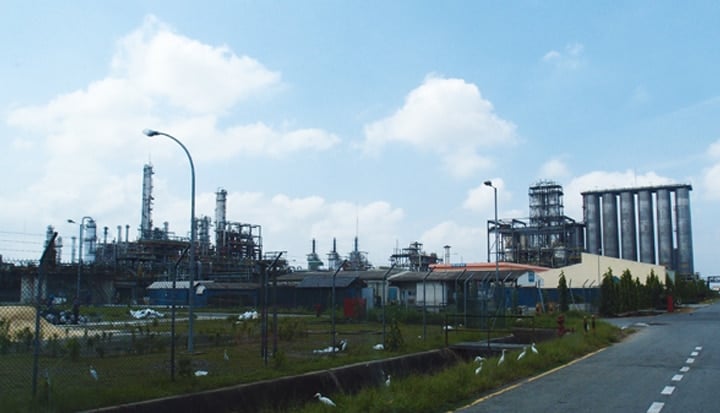In 2006, the Indorama Corporation acquired the Eleme Petrochemicals Company (IEPL) from the Nigerian National Petroleum Corporation, as part of a government-led privatisation programme. Indorama is an Indonesian-based manufacturer of petrochemicals and associated downstream products that operates in 19 countries.
Located just outside Port Harcourt in the Niger Delta, IEPL is a 360 hectare site, with polyethylene and polypropylene production facilities. The site is currently being expanded to include a new urea-based fertilizer plant. Since acquiring IEPL, Indorama has made significant improvements to many areas of the business, including increasing production. However, some of the greatest strides that have been made are in the environmental and social (E&S) standards at IEPL. This has included both improving community relations and implementing a number of health and safety management systems.
Nigeria is the largest country in Africa by population, with 158 million people1. Although oil-rich, the country faces numerous developmental challenges, including high unemployment, particularly amongst youth. While numerous reforms have been undertaken over the past ten years, the Niger Delta region has consistently been the focus of social unrest and environmental degradation. The area accounts for 90% of Nigeria’s oil revenue and the conflict between the local communities, oil companies and the Government has meant that there are significant environmental and social risks for businesses operating in the region.
“It has been a long journey for Indorama over the past eight years,” said Munish Jindal, Director of Finance at IEPL. “While there were many processes in place, we needed to improve environmental and social standards. The support provided by our investors has been important,” he added.
1 http://www.worldbank.org/en/country/nigeria/overview
COMMUNITY RELATIONS IN THE NIGER DELTA
When Indorama acquired IEPL, it faced considerable challenges with regards to community relations, which were typical of other companies operating in the Niger Delta.
Many companies hired workers from outside the local communities, which did little to address the issue of unemployment in the region. Furthermore, local communities felt they were not benefitting from the vast oil and gas resources within the region, given the level of exports, and with few economic or broader development benefits being delivered in the Delta. As a result, companies were faced with civil unrest and substantial security risks, which generate significant costs and operational hurdles.
Indorama’s response was not to simply increasing security, but to manage and reduce these risks by adding real value to the host communities. It achieved this by implementing the following business practices:
|
INDORAMA’S BUSINESS PRACTICES |
|
|
Community-owned model: |
The company developed an innovative profit sharing programme that was unique to the region. It assigned 7.5% of the shares of the company to the six local communities, thus providing the residents of the region with an ownership stake in the company. The communities have used the dividends to fund social improvement projects, including the construction of new roads and schools. |
|
Local employment opportunities: |
87% of employees at IEPL are Nigerian, including 55% from the local communities. This has been crucial to addressing the poverty affecting the region and the contractors involved in the project have signed memorandums of understanding with the local communities agreeing to recruit locals wherever possible. |
|
Training of local security personnel: |
The company hired private security to complement the security provided by the Nigerian military and police, all of whom must be recommended from the chief of their local community. Security personnel are screened and importantly, trained in best practice, including the appropriate use of force and conduct towards workers and community members. Again, this provides local employment opportunities, while ensuring closer relations with the community. |
The company signed a memorandum of understanding with the local communities, which provides a detailed description of the community projects the company will carry out. This is crucial in terms of managing expectations (reducing the risk of rent seeking behaviour) and allocating responsibilities and accountabilities between the company and other stakeholders. The initiatives implemented by IEPL include scholarships, community development and health clinics. For example, each year the company awards scholarships to 15 students who are studying engineering in universities in Nigeria. IEPL also hosts social activities such as football tournaments, designed to allow employees to interact with community members.
As part of its ownership structure, IEPL also assigned 2.5% of company shares to employees, which is managed by the employee unions. This scheme not only helps create alignment between employees and the company, but can also help attract, motivate and retain talented employees – one of the principal ways in which a commitment to good staff employment practices improves a company’s financial performance.
Indorama’s approach has resulted in strong working relationships with the local communities, which ultimately means that the company has:
- Decreased its risk profile and protected itself against future liabilities associated with attacks and assaults, as well as operational costs and complexities
- Increased its ability to attract and develop local talent, through scholarship programmes, employee shares and a safe working environment.
- Strengthened its social licence to operate, by gaining and maintaining the trust of local communities.
- Established a stronger relationship with the Nigerian Government by creating employment opportunities for Nigerians, which facilitates the ease with which it can do business in future.
- Attracted capital from investors.










